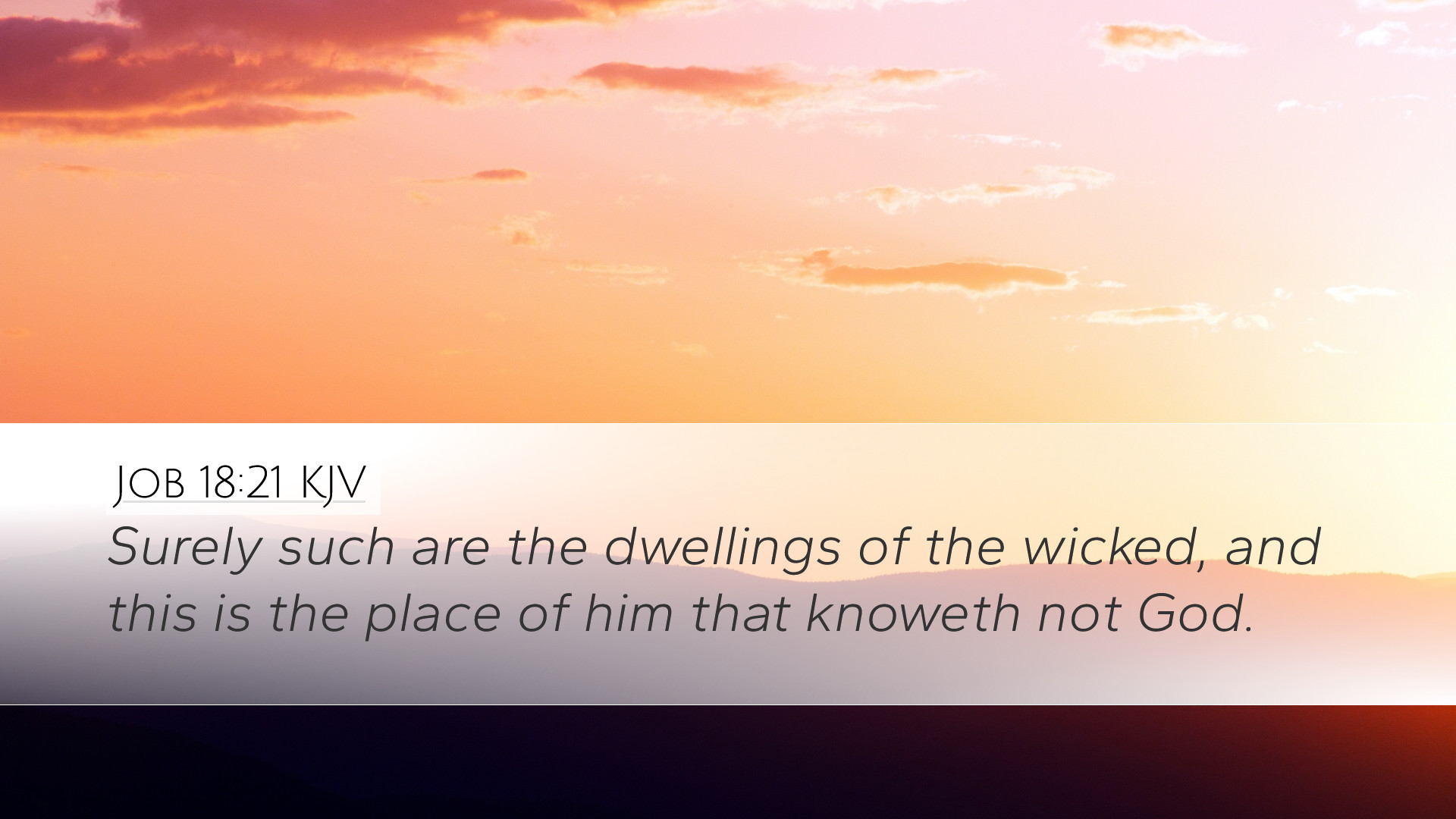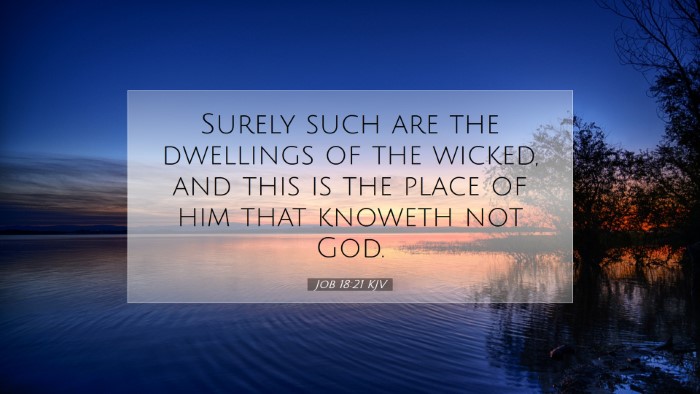Old Testament
Genesis Exodus Leviticus Numbers Deuteronomy Joshua Judges Ruth 1 Samuel 2 Samuel 1 Kings 2 Kings 1 Chronicles 2 Chronicles Ezra Nehemiah Esther Job Psalms Proverbs Ecclesiastes Song of Solomon Isaiah Jeremiah Lamentations Ezekiel Daniel Hosea Joel Amos Obadiah Jonah Micah Nahum Habakkuk Zephaniah Haggai Zechariah MalachiJob 18:21
Job 18:21 KJV
Surely such are the dwellings of the wicked, and this is the place of him that knoweth not God.
Job 18:21 Bible Commentary
Commentary on Job 18:21
Job 18:21 states:
"Surely such are the dwellings of the wicked, and this is the place of him that knoweth not God."
Contextual Overview
In the book of Job, we encounter profound insights into suffering, justice, and the nature of God. This verse appears in the context of Bildad's speech in which he articulates the fate of the wicked. The dialogues of Job and his friends reveal a deep exploration of theodicy and human suffering.
Commentary Insights
1. Matthew Henry's Perspective
Matthew Henry emphasizes that Bildad’s assertion is aimed at illustrating the consequences of a life lived in rebellion against God. He draws a parallel between the physical destruction seen in the wicked and their spiritual state. Henry argues that the verse serves as a motif for the ultimate judgment that awaits the unrighteous, portraying their lives as characterized by desolation rather than divine favor.
-
The Dwelling of the Wicked:
Henry implies that the term "dwellings" symbolizes not only physical locations but also the spiritual condition of the wicked, suggesting a desolate existence devoid of true peace or contentment.
-
Lack of Divine Knowledge:
He notes that those who do not know God are depicted as living in darkness and ignorance, thus facing inevitable destruction as a consequence of their separation from divine wisdom.
2. Albert Barnes' Comments
Albert Barnes provides a more analytical view, focusing on the rhetorical nature of Bildad's assertion. He highlights the moral declarations of the text, arguing that it serves as clarity regarding the nature of divine retribution and the fate of the wicked.
-
Divine Justice:
Barnes argues that the verse reflects an unchangeable principle of divine justice, illustrating how the wicked, devoid of God's grace, can expect to reap suffering and destruction as a result of their actions.
-
Contrast with the Righteous:
In his commentary, Barnes contrasts the fate of the righteous with that of the wicked, emphasizing that while the righteous may face trials, their ultimate end is different—marked by redemption and restoration.
3. Adam Clarke's Analysis
Adam Clarke’s examination of this verse involves a historical and traditional interpretation, connecting it to the broader themes within the book of Job. He notes that Bildad, like others in the discourse, speaks from a perspective shaped by traditional wisdom, yet often misses the deeper truths of God’s character.
-
Tradition of Retribution:
Clarke comments on the traditional belief in retribution, where the actions of the wicked are immediately met with consequences, which may not always represent the complexities of divine justice as exhibited in Job's situation.
-
Conditional Expressions:
He also highlights the conditional phrases often included in discussions of punishment, pointing out that these expressions reflect human limitations in understanding the divine narrative.
Theological Reflections
Theological interpretations of Job 18:21 lead us to consider the nature of God’s judgment and the implications of a life detached from Him. As we delve deeper, several themes emerge for contemplation and teaching among pastors, students, and theologians:
-
The Nature of Evil:
This verse invites reflection on the nature of evil and its consequences. Understanding that a departure from God equates to a demise in both moral and spiritual dimensions resonates deeply in pastoral teachings.
-
God’s Sovereignty:
The acknowledgment of God’s sovereignty is paramount in the context of suffering. The verse reinforces the belief that God's justice is ultimately served, and this provides comfort amidst trials.
-
Human Understanding of Suffering:
In light of this verse, scholars are encouraged to explore how human interpretations of suffering and divine justice may align or conflict with scriptural truths, fostering an ongoing dialogue about the nature of faith in adversity.
Conclusion
Job 18:21 serves as a critical reminder of the weighty consequences of living a life apart from God. Through the lens of commentaries from Matthew Henry, Albert Barnes, and Adam Clarke, we glean vital insights into the theological and moral fabric of this ancient text, which continues to resonate with the modern believer. The discourse encapsulated in these reflections remains essential for guiding theological thought, pastoral care, and personal spiritual growth.


